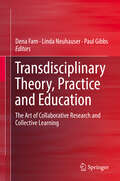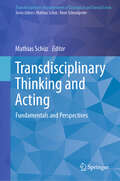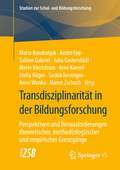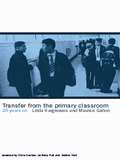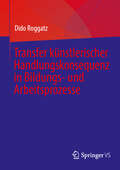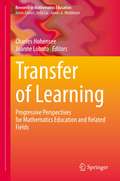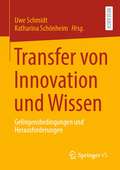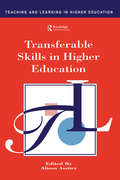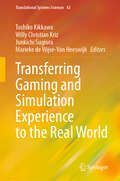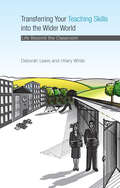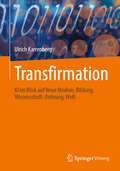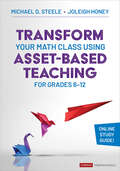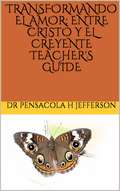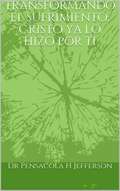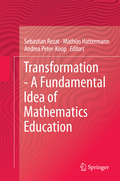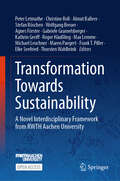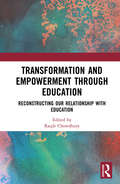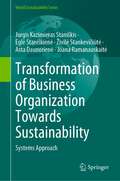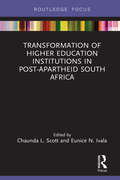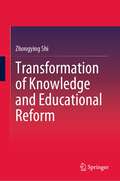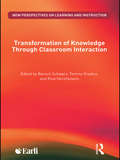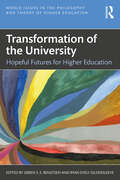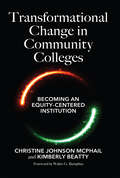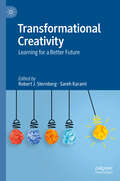- Table View
- List View
Transdisciplinary Theory, Practice and Education: The Art Of Collaborative Research And Collective Thinking
by Paul Gibbs Dena Fam Linda NeuhauserThis exciting new state-of-the art book reviews, explores and advocates ways in which collaborative research endeavours can, through a transdisciplinary lens, enhance student, academic and social experiences. Drawing from a wide range of knowledges, contexts, geographical locations and internationally renowned expertise, the book provides a unique look into the world of transdisciplinary thinking, collaborative learning and action. In doing so, the book is action orientated, reflective, theoretical and intriguing and provides a place for all of these to meet and mingle in the spirit of curiosity and imagination.
Transdisciplinary Thinking and Acting: Fundamentals and Perspectives (Transdisciplinary Management of Ecological and Social Crises)
by Mathias SchüzComplex problems can only be overcome with complex solutions. This dictum by Albert Einstein also applies to current world problems such as climate change, species extinction, the littering of our planet, and the growing gap between rich and poor. They overwhelm individual scientific disciplines. Therefore, they can only be solved through transdisciplinarity, i.e. beyond the individual disciplines in interaction with empirical knowledge of different provenance and philosophical reflection. This first volume of the book series "Transdisciplinary Management of Social and Ecological Crises" explains how transdisciplinarity is to be understood in general, what approaches exist, and how they contribute to solving the various world problems. In this context, the book addresses, among other things, the replacement of man's claim to dominion over nature, the overcoming of culturally determined boundaries in human communities, and integrative and agile management methods in business, politics, art, and society. It deals with a sustainable circular economy, new forms of politics in the interest of all instead of a few, learning from artists, healthy and environmentally sound nutrition, and spiritual mindfulness in dealing with oneself and other ways of life. Thus, the book is aimed at a broad audience from different disciplines interested in the perspective of and interaction with other disciplines to solve global problems. Chapter "Methodology of Transdisciplinarity–Levels of Reality, Logic of the Included Middle and Complexity" is available open access under a Creative Commons Attribution 4.0 International License via link.springer.com.
Transdisziplinarität in der Bildungsforschung: Perspektiven und Herausforderungen theoretischer, method(olog)ischer und empirischer Grenzgänge (Studien zur Schul- und Bildungsforschung #91)
by Merle Hinrichsen Julia Gasterstädt Saskia Terstegen Anna Wanka Maren Zschach Sabine Gabriel Maria Kondratjuk André Epp Arne Koevel Stella RügerDer Band diskutiert Implikationen der Transdisziplinarität für die Bildungsforschung und zeigt die darin angelegten Grenzen und Grenzüberschreitungen auf. Er reflektiert aktuelle Themen- und Problemstellungen, die sich mit Blick auf die heterogenen Perspektiven in bildungs- und erziehungswissenschaftlichen Disziplinen zu Transdisziplinarität ergeben. So stehen theoretische, method(olog)ische und empirische Grenzgänge im Fokus, die sowohl mit einer Eingebundenheit in spezifische fachliche Disziplinen und die daran geknüpften wissenschaftstheoretischen Positionen als auch mit der Notwendigkeit eines Blickens ‚über den Tellerrand hinaus’ einhergehen. Ziel ist es, Bezüge, Anleihen und Anknüpfungspunkte, Unschärfen, Irritationen, Voraussetzungen und Herausforderungen für eine transdisziplinäre Bildungsforschung aufzuspüren und abzubilden.
Transfer from the Primary Classroom: 20 Years On
by Linda Hargreaves Maurice GaltonThe ORACLE (Observation and Classroom Learning and Evaluation) and its follow-up study address the following questions:Has teaching in the primary school changed over the past twenty years?Has pupil performance improved or declined?Are the links between certain teacher approaches and pupil achievement still the same?Has the National Curriculum had any important consequences for the way in which transfer is conducted?One of the main claims of the National Curriculum is that it has provided greater continuity through the various stages and this should be reflected in smoother transition from one school to the next. This book focuses on the issue of transfer from the primary to the secondary school, using data from the ORACLE project.This study which took place from 1975 to 1980, followed by 'Son of ORACLE', the study of group-work in the primary classroom 1980 to 1983, has had an enormous influence on the debate on primary education. The studies described in detail what took place in primary classrooms, the teaching styles used by teachers and the responses made by pupils. It linked these processes to pupil performance. Finally, it followed the pupils as they transferred out of the primary school into the secondary phase of education. At present a new research project is being carried out in Leicester. It involves studying primary schools for one year and then following the children as they transfer to the secondary phase or to a middle school. The project involves two thirds of the schools used in the original ORACLE research. In addition, the same observation instruments and the same tests, modified for cultural differences, are being used.
Transfer künstlerischer Handlungskonsequenz in Bildungs- und Arbeitsprozesse
by Dido RoggatzDieses Buch verdeutlicht das Potenzial künstlerischer Erfahrungen durch die vollständige Identifikation mit dem eigenen Tun und einer Expertise in eigenverantwortlichen Prozessen – essenzielle Faktoren für Bildung und Arbeitswelt. Neben neuen Handlungsoptionen stärkt das gewonnene Vertrauen in die eigene Handlungskompetenz eine Flexibilität und Offenheit gegenüber unerwarteten Situationen. Die Publikation richtet sich an Entscheidungsträger:innen und Fachkräfte aus Bildung, Forschung und Wirtschaft. Es bietet praxisnahe Ansätze zur Förderung einer zukunftsfähigen Gesellschaft.
Transfer of Learning: Progressive Perspectives for Mathematics Education and Related Fields (Research in Mathematics Education)
by Charles Hohensee Joanne LobatoThis book provides a common language for and makes connections between transfer research in mathematics education and transfer research in related fields. It generates renewed excitement for and increased visibility of transfer research, by showcasing and aggregating leading-edge research from the transfer research community. This book also helps to establish transfer as a sub-field of research within mathematics education and extends and refines alternate perspectives on the transfer of learning. The book provides an overview of current knowledge in the field as well as informs future transfer research.
Transfer von Innovation und Wissen: Gelingensbedingungen und Herausforderungen
by Uwe Schmidt Katharina SchönheimOb und wie Ideen und Projekte aus Förderprogrammen an Hochschulen und in anderen Organisationen in die Breite transferiert werden, ist Gegenstand des vorliegenden Buchs. Ausgehend von einer theoretischen und methodischen Hinführung zum Thema Transfer werden Programme und Projekte vorgestellt, die sich der Übertragung innerhalb oder auch zwischen Hochschulen bzw. Organisationen widmen. Hierbei werden sowohl Herausforderungen als auch Gelingensbedingungen für Transfer in den Blick genommen. Die Praxiserfahrungen regen zum Nachmachen an.
Transferable Skills in Higher Education
by Alison AssiterThis text uses a case study approach to show how life-skills can be developed in a range of higher education subject areas. It also looks at the changes which can be made to the curriculum to facilitate this sort of learning. The case studies are set against a more theoretical background.
Transferring Gaming and Simulation Experience to the Real World (Translational Systems Sciences #43)
by Willy Christian Kriz Toshiko Kikkawa Junkichi Sugiura Marieke de Wijse-van HeeswijkThis book focuses on how to connect the gaming experience to the real world. Looking back at the history of the Simulation and Gaming field, it has offered the solution to social problems such as policy making, decision making for business strategies, education and training, environmental issues, urban planning, or disaster awareness. In other words, Gaming Simulation always has had a close connection to the reality. The interconnected modern societies nowadays have become even more complex and ambiguous, as the UN SDGs goals show. Gaming is one of the suitable tools to suggest ways to achieve our goals in a world of uncertainty. Learning starts by experiencing games and their effects in a safe environment. An important part of the gaming simulation process are methods for a transfer of the game-based learning to and an application within reality. However, connecting the experience to reality is not always facile for all the participants, no matter how comprehensive the debriefing is. In addition to debriefing, further transfer methods and conditions have to be implemented in order to create a real change of behavior and systems. The book's authors tackle the challenge by introducing concrete practices and offering various hints for readers struggling to solve a similar issue. In addition, when applying the experience of gaming, we have to carefully consider several ethical issues, which are also covered in this book.
Transferring your Teaching Skills into the Wider World: Life Beyond the Classroom
by Hilary White Deborah LewisAre you seeking to use your subject knowledge and teaching skills beyond the classroom? Many teachers don’t recognise the vast range of skills, expertise and experience they possess. Transferring your Teaching Skills into the Wider World will help you focus on how you can use your many transferable skills in a variety of contexts and settings across the educational sector and beyond. Deborah Lewis and Hilary White identify the skills developed through a teaching career and match them with the wide range of jobs open to teachers looking for a new direction. This highly practical handbook: Illustrates the diverse ways in which you can utilise your teaching skills and experience Surveys a wide variety of education related jobs and training options, using case studies to explore their advantages and disadvantages Explores the opportunities open to teachers seeking a complete career change Gives helpful advice for those wishing to develop their career within education The case studies are inspiring examples of individuals who have drawn on their teaching experiences to expand into other areas, describing the route they took and showing how they utilized their teaching expertise. Tips and hints show how you can follow a similar path. Transferring your Teaching Skills into the Wider World is essential reading for any teacher looking for guidance on how to change or develop their career whilst making the most of their existing skills and experience.
Transfirmation: KI im Blick auf Neue Medien, Bildung, Wissenschaft. Ordnung, Welt
by Ulrich KarrenbergDieses Buch widmet sich der Frage, wie KI als treibende Kraft in den Bereichen Medien, Bildung, Wissenschaft, gesellschaftlicher Ordnung und unserer globalen Welt wirkt. Es ist eine Einladung, nicht nur zu verstehen, was diese Technologien bewirken, sondern auch, welche Möglichkeiten und Herausforderungen sich daraus ergeben.
Transform Your Math Class Using Asset-Based Teaching for Grades 6-12 (Corwin Mathematics Series)
by Michael D. Steele Joleigh HoneyFoster a love of mathematics by creating a more inclusive and empowering learning environment through asset-based teaching! An asset-based perspective on math education means starting with what students already know instead of focusing on what’s missing. This approach elevates student thinking and reasoning skills. In this way, educators acknowledge that all students bring prior experiences, strengths, talents, and resources to the learning process and can contribute meaningfully in an authentic learning environment. Transform Your Math Class Using Asset-Based Teaching for Grades 6-12 provides insight into asset-based perspectives in mathematics education to create an environment where all students feel valued and capable of being doers of mathematics. In the book, Michael Steele and Joleigh Honey highlight the importance of using language, instructional routines, and systemic structure that positively impact student engagement, their math identity, and ultimately their outcomes. Providing a wealth of knowledge and practical strategies that can be used to transform math classrooms into inclusive, supportive, and empowering learning environments, this book: Introduces an asset-based perspective that focuses on students′ strengths, assets, and potential to learn mathematics Includes a variety of frameworks and tools that teachers can use to build and grow their sense of asset-based perspectives Offers strategies for promoting a growth mindset in mathematics, encouraging productive struggle in math, and promoting equitable math instruction Supports teachers in reflecting on their decisions, self-awareness, and self-management Includes a companion online study guide to support teachers individually or as part of a professional learning community Adopting asset-based perspectives is about movement over time, not about flipping a switch. This book paves the path for an asset-based journey that ultimately helps to transform our math classrooms and advance all students’ learning and development.
Transform Your Math Class Using Asset-Based Teaching for Grades 6-12 (Corwin Mathematics Series)
by Michael D. Steele Joleigh HoneyFoster a love of mathematics by creating a more inclusive and empowering learning environment through asset-based teaching! An asset-based perspective on math education means starting with what students already know instead of focusing on what’s missing. This approach elevates student thinking and reasoning skills. In this way, educators acknowledge that all students bring prior experiences, strengths, talents, and resources to the learning process and can contribute meaningfully in an authentic learning environment. Transform Your Math Class Using Asset-Based Teaching for Grades 6-12 provides insight into asset-based perspectives in mathematics education to create an environment where all students feel valued and capable of being doers of mathematics. In the book, Michael Steele and Joleigh Honey highlight the importance of using language, instructional routines, and systemic structure that positively impact student engagement, their math identity, and ultimately their outcomes. Providing a wealth of knowledge and practical strategies that can be used to transform math classrooms into inclusive, supportive, and empowering learning environments, this book: Introduces an asset-based perspective that focuses on students′ strengths, assets, and potential to learn mathematics Includes a variety of frameworks and tools that teachers can use to build and grow their sense of asset-based perspectives Offers strategies for promoting a growth mindset in mathematics, encouraging productive struggle in math, and promoting equitable math instruction Supports teachers in reflecting on their decisions, self-awareness, and self-management Includes a companion online study guide to support teachers individually or as part of a professional learning community Adopting asset-based perspectives is about movement over time, not about flipping a switch. This book paves the path for an asset-based journey that ultimately helps to transform our math classrooms and advance all students’ learning and development.
Transformando El amor: TRANSFORMANDO EL AMOR: ENTRE CRISTO Y EL CREYENTE TG
by DR Pensacola H JeffersonPara disfrutar verdaderamente el viaje cristiano, el creyente debe conocer la diferencia. Una relación no se trata de seguir un conjunto de reglas, sino de la reciprocidad entre personas unidas o en una unión con otra que implica amor genuino, compromiso, honestidad y fidelidad. "... te he amado con un amor eterno ..." (Jeremías 31: 3 NASB). “… Ciertamente, Él ama a la gente…” (Deuteronomio 33: 3 NASB). “… Dios ha dicho“ Nunca te dejaré; nunca te desampararé… ”(Hebreos 13: 5 NVI). "... Tu palabra es VERDAD (HONESTA) ..." (JUAN 17:17 RV). “… Permanece fiel [en sus relaciones de pacto], porque no puede negar quién es…” (2 Timoteo 2:13 NTV). La relación de “un solo espíritu” es una intimidad espiritual que solo puede ser entendida por revelación divina (a través del Espíritu Santo que mora en nosotros) y experimentada por fe (dependiendo del poder de su Palabra). “… POR FE (al depender de Dios, el Espíritu Santo que mora en nosotros) [tenemos el poder de] ... entender (o recibir conocimiento de revelación) que… lo que ahora vemos no provino de nada que pueda verse (la OBRA confirmadora del ESPÍRITU SANTO de Dios) ". (Hebreos 11 NLT). “… POR LA PALABRA (que activa la OBRA confirmadora del ESPÍRITU SANTO) del Señor [TODAS LAS COSAS VINIERON O LLEGARÁN A SER]…” (Salmos 33: 6 NASB). Tú, el creyente, estás "unido" a Dios a través de Jesucristo. Un cuerpo tiene muchas partes, pero solo cuando esas partes están unidas, forman un cuerpo. "... El amor ... es el VINCULO perfecto de unidad ..." (Colosenses 3:14 NASB). "Porque por un Espíritu, [somos] todos bautizados en un cuerpo ..." (1 Corintios 12:13). "... EL QUE ESTÁ UNIDO AL SEÑOR (Jesús, la Palabra de Dios) ES UN ESPÍRITU ... [con Dios otra vez] ..." (1 CORINTIOS 6:17 RV).
Transformando el sufrimiento: GUÍA PARA MAESTROS
by Dr Pensacola H JeffersonTransformando el sufrimiento: cristo ya lo hizo por ti. Este libro te dice cómo el sufrimiento demostrará qué o a quién amas "realmente". Satanás está listo y dispuesto a provocar los problemas que él cree que te pondrán en contra de Dios. Satanás le dijo a Dios acerca de Job: "...Pero extiende la mano y quítale todo lo que posee, ¡a ver si no te maldice en tu propia cara! "(JOB 1: 7-12 NVI). Sus acusaciones eran totalmente infundadas.
Transformation - A Fundamental Idea of Mathematics Education
by Sebastian Rezat Mathias Hattermann Andrea Peter-KoopThe diversity of research domains and theories in the field of mathematics education has been a permanent subject of discussions from the origins of the discipline up to the present. On the one hand the diversity is regarded as a resource for rich scientific development on the other hand it gives rise to the often repeated criticism of the discipline's lack of focus and identity. As one way of focusing on core issues of the discipline the book seeks to open up a discussion about fundamental ideas in the field of mathematics education that permeate different research domains and perspectives. The book addresses transformation as one fundamental idea in mathematics education and examines it from different perspectives. Transformations are related to knowledge, related to signs and representations of mathematics, related to concepts and ideas, and related to instruments for the learning of mathematics. The book seeks to answer the following questions: What do we know about transformations in the different domains? What kinds of transformations are crucial? How is transformation in each case conceptualized?
Transformation Towards Sustainability: A Novel Interdisciplinary Framework from RWTH Aachen University
by Gabriele Gramelsberger Peter Letmathe Frank T. Piller Roger Häußling Wolfgang Breuer Michael Leuchner Stefan Böschen Agnes Förster Elke Seefried Christine Roll Almut Balleer Kathrin Greiff Max Lemme Maren Paegert Thorsten WahlbrinkThe global environmental crisis, technological developments, the COVID-19 pandemic, and ongoing economic and political globalization are just a few of the developments that are massively increasing the pressure for transformation on regions, companies and society as a whole. In addition, the digital age is accelerating transformation processes that are already underway. This contributed book addresses these developments and presents a new framework for transformation research and practice that has been developed and already validated by researchers of the RWTH Aachen University. The RWTH way includes inter- and transdisciplinary approaches from many disciplines, looking at technological and societal change from different perspectives. A distinction is made between analysis, i.e., research on transformation processes, impact, i.e., transformational research, and change in research itself, i.e. research transformation. The book not only creates a new understanding of transformation research, but also provides actionable impulses for scholars and practitioners in many fields. This is an open access book.
Transformation and Empowerment through Education: Reconstructing our Relationship with Education
by Raqib ChowdhuryTransformation and Empowerment through Education challenges the normalisation of Western discourses as the optimal choice for empowering education. The book aims to reconstruct our relationship with education and employs contemporary theories in order to understand some of the most persistent phenomena in contemporary education and its role in our lives. Written by professionals with experience of a wide range of academic and institutional conventions and traditions, and from diverse ethnocultural backgrounds, this book effectively presents a global perspective on educational practices, both inside and outside the classroom. The range of topics covered includes equity, access, inclusivity, social justice, leadership and the internationalisation of teaching. This book, based on empirical studies using key methodologies, is ideal for academics and postgraduate researchers interested in critical pedagogy, educational studies and educational linguistics, as well as educators and policymakers around the world.
Transformation of Business Organization Towards Sustainability: Systems Approach (World Sustainability Series)
by Asta Daunorienė Jurgis Kazimieras Staniškis Eglė Staniškienė Živilė Stankevičiūtė Joana RamanauskaitėWe have entered a new era where business, technologies, communities, and even pandemic deceases cross borders with unprecedented speed and intensity. 2030 Agenda and 17 SDGs reflect the global community's high expectations of finally reversing the destruction of our natural and social habits, and achieving a more balanced and equitable pathways toward well-being of all. However, despite the initial efforts, the world is not on track to achieving the most of the 169 targets that comprise the goals. It is evident that we have a system problem, so we need a system solution. Authors presented a hierarchical system consisting of two-level management systems: first level—unsustainability reduction systems and second level—control system for transformations toward sustainability. The book clearly shows that implementation of systems for unsustainability reduction and for transformations toward sustainability is possible, and that sufficient knowledge is available to get started. It is designed for researchers, practitioners, and politicians.
Transformation of Higher Education Institutions in Post-Apartheid South Africa
by Chaunda L. Scott Eunice N. IvalaThis book outlines successful transformation strategies and efforts that have been developed to assist the South African higher education system in moving beyond its post-apartheid state of being. Through case studies authored by South African higher education scholars and scholars affiliated with South African institutions, this book aims to highlight the status of transformation in the South African higher education system; demonstrate the variety of transformation initiatives used in academic institutions across South Africa; and offer recommendations to further advance this transformation. Written for scholars and advanced students of higher education in international settings, this volume aims to support quality research that benefits the demographic composition of South African academics and students, and offers lessons that can inform higher education transformation in similarly multicultural societies.
Transformation of Knowledge and Educational Reform
by Zhongying ShiThis book defines the concept of knowledge transformation, describes the historical process of knowledge transformation, and analyses its deep influence on education theory and practice by virtue of multiple discipline resources. The general scope of this book encompasses the philosophy of education, curriculum studies, and education reform research. It enables readers to understand how 'hidden' epistemological factors have changed or reshaped the education system throughout history and at present.
Transformation of Knowledge through Classroom Interaction (New Perspectives on Learning and Instruction)
by Tommy Dreyfus Baruch Schwarz Rina HershkowitzClassrooms provide extremely varied settings in which learning may take place, including teacher-led conversations, small group unguided discussions, individual problem solving or computer supported collaborative learning (CSCL). Transformation of Knowledge through Classroom Interaction examines and evaluates different ways which have been used to support students learning in classrooms, using mathematics and science as a model to examine how different types of interactions contribute to students’ participation in classroom activity, and their understanding of concepts and their practical applications. The contributions in this book offer rich descriptions and ways of understanding how learning occurs in both traditional and non-traditional settings. Combining theoretical perspectives with practical applications, the book includes discussions of: the roles of dialogue and argumentation in constructing knowledge the role of guidance in constructing knowledge abstracting processes in mathematics and science classrooms the effect of environment, media and technology on learning processes methodologies for tracing transformation of knowledge in classroom interaction. Bringing together a broad range of contributions from leading international researchers, this book makes an important contribution to the field of classroom learning, and will appeal to all those engaged in academic research in education.
Transformation of the University: Hopeful Futures for Higher Education (World Issues in the Philosophy and Theory of Higher Education)
by Søren S. E. BengtsenTransformation of the University imagines preferable futures for the university, building hope for the institution’s necessary transformation. It transcends old criticisms and presents fresh ideas on how the institution might be conceived, organised and put into practice while safeguarding that which makes it a university – the pursuit of knowledge. This book is divided into three main parts: Part One – ‘Knowledge’ assumes the role of the university in generating knowledge for the benefit of society; Part Two – ‘Cultural Growth’ expands on how the university might contribute to and benefit from the cultural growth of society, with both explicit and implicit connections to social and epistemic (in)justice; and Part Three – ‘Institutions’ focuses on imaginative processes for enacting the university as an institution that meets the unforeseen future challenges facing societies around the world. With contributions from scholars across the world, Transformation of the University is an essential read for all academics, practitioners, institutional leaders and broad social thinkers who are concerned with the future of the university and its contributions to society.
Transformational Change in Community Colleges: Becoming an Equity-Centered Institution
by Christine Johnson McPhail Kimberly BeattyFrom the foreword by Walter G. Bumphus, President & CEO of AACC: “Becoming an Equity-Centered Higher Education Institution is a significant contribution to the on-going struggle to find practical approaches to implementing an equity agenda in higher education.” The authors had three main goals for this text: Relevance: This book is the result of many years of teaching, leading, researching, and coaching individuals and institutions about equity inside higher education. The authors place a clear emphasis on awareness and teaching skills first, but also ensure that those skills are based on practical application in the field. Practical Application: To describe and explain equity and transformational change concepts, this book provides step-by-step implementation approaches that can be used to integrate equity-centered principles into practices and policies to implement or improve equity work into the organizational culture. A Purposeful Approach: The authors defined the act of becoming an equity-centered institution in terms of a transformational change approach using Kotter’s Eight-Stage Process. Kotter’s Model and AACC’s Leadership Competencies for Community College Leaders are introduced in Chapter 1 and integrated throughout the book. This integrated framework allows practitioners to place the intersectionality of equity, transformational change, and requisite leadership competencies into the larger context of higher education. While using Kotter’s 8-Step Change Model, the authors emphasize that operations and situations inside higher educational institutions are not linear as implied in Kotter’s model. They show how the stages of change may occur at different times and different situations at different institutions, and demonstrate what leadership competencies are recommended for each stage in the change process.
Transformational Creativity: Learning for a Better Future
by Robert J. Sternberg Sareh KaramiThis edited volume brings together leading scholars in diverse disciplines to share their best thinking on how creativity can be conceived of, taught for, and deployed to serve rather than undermine humanity. Transformational creativity, as defined in this book, is creativity deployed to make a positive, meaningful, and potentially enduring difference to the world. Transformational creativity is compared to transactional creativity, which is creativity deployed in search of a reward, whether externally or internally generated.
